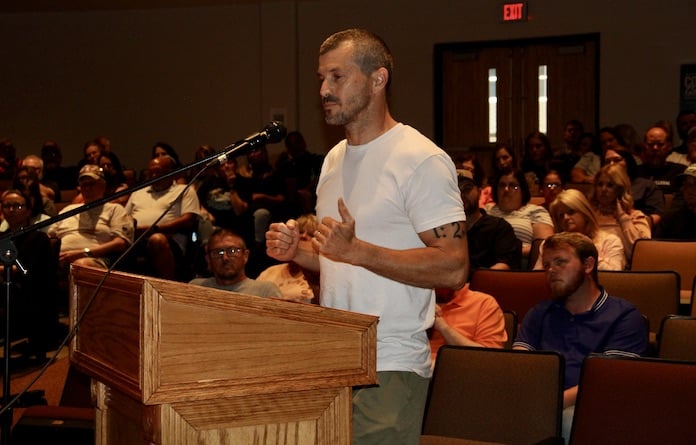Gender policy debate persists

Seeing similar turnout to last month’s meeting, the Waterloo School Board hosted its July meeting in the Waterloo High School auditorium Monday night as the controversy surrounding the district’s new gender and bathroom policy continues to swirl.
In-person attendance was comparable to, if not greater than, turnout for the March meeting when transgender students’ use of bathrooms which align with their gender was first called into question.
Despite the substantial turnout, Monday’s meeting was notably shorter than last month’s due to a rule implemented by the board limiting public participation to 30 minutes total.
It is also worth noting that two petitions regarding the new bathroom policy have been circulating recently.
The first is a petition from the group Stand Up for Students-Waterloo, which requests the board revoke the district’s current bathroom policy and instead implement a bathroom/locker room policy which requires every student to use the facility which aligns with their sex assigned at birth.
The other petition, from Waterloo Listens, requests the board maintains a gender identity and bathroom policy which complies with the Illinois Human Rights Act, further requesting that the board use taxpayer funds to implement safety upgrades to restrooms and doesn’t adopt policies in violation of state and federal laws.
Following roll call and the Pledge of Allegiance, the meeting opened with Waterloo School Board President Lori Dillenberger noting the agenda had been adjusted slightly, with public participation moved up to allow those uninterested in the rest of the meeting the opportunity to step out earlier.
Dillenberger also remarked on the conduct of those who attended the June meeting, which was especially heated at times.
“I think we all experienced something we thought we would never see in a board meeting in Waterloo, and something we hope we never see again,” Dillenberger said. “We welcome you to address the board with your questions and concerns, but we want you to do it respectfully. Last meeting, there was quite a bit of disrespect toward us and toward each other, and it shouldn’t be that way.”
The first of six individuals signed up to speak was Melissa Milano, who opened by thanking the board for its willingness to respond to questions, though she added written responses would be optimal.
Milano also expressed her frustration with the board for the new 30-minute limit for public participation, saying the community has expressed a need to disagree with the board’s policy decision.
She further said the board – and other school boards in the country – should stand with those who disagree with transgender bathroom accommodations, adding that the board is abandoning the community for a recommendation, not a law.
The board previously described the legal basis for its new bathroom policy in an email to parents prior to the June meeting, citing the Illinois Human Rights Act.
“With this new policy, you have opened the door that trades one vulnerability with another, possibly even bigger one,” Milano said. “There is a lot of irony in the thought that gender-dysphoric girls are able to use restrooms with only biological males, but biological males are prohibited from using restrooms with only biological males.”
Zac Scheetz was next to speak. As he opened his presentation at the June meeting, he commended students who participated in the initial March protest at Waterloo High School.
Scheetz emphasized his feeling that the school board is not doing its job of protecting its students, noting he and his family were recently on a trip in a “third world country” where he was unconcerned about letting his daughters use a public bathroom but is losing sleep about how they will use the restroom at school.
“You guys have one job, and that’s to protect all these children, all of them,” Scheetz said. “They all get bullied, they all get pushed around, but we’re forcing them into situations that are gonna make it worse, not better.”
Scheetz also made mention of a substitute teacher in Quincy who “decided to be bi, or that was bi or is bi or whatever,” who took pictures of girls in restrooms only for the school board to ignore the issue.
It is unclear to what specific incident Scheetz was referring.
Elizabeth Mifflin then spoke, first presenting the Stand Up for Students petition which she said had accrued 1,517 signatures as of the meeting.
Mifflin said the previously discussed idea of building out new bathrooms could provide a path forward, but the board would need to find a temporary solution while those bathrooms are constructed.
Like Milano, Mifflin urged the board to stand with the community, suggesting board
members should step down if they are unwilling to respond to hard decisions.
She also expressed that members of the community are willing to stand with the board should the district face any lawsuits as a result of adopting a policy in line with what Stand Up for Students is petitioning for.
“We understand what’s at stake,” Mifflin said. “We understand that there are threats of lawsuits, but we also understand that our kids are the ones that are really at stake. Our community is saying that we are willing to stand with you, knowing full well what the repercussions of standing could be, and yet we ask you to stand all the same.”
Fourth on the list of scheduled speakers was Gerri Mazdra of Waterloo Listens, though her son, WHS senior Brayden Mazdra, spoke in Gerri’s place.
Mazdra urged the board to comply with the law, specifically referencing the Illinois Human Rights Act and how it outlines that students have the right to avoid harassment and discrimination based on gender identity.
“The act specifically says the discomfort or privacy of other students, teachers or parents are not valid reasons to deny or limit the full and equal use of facilities based on a student’s gender identity,” Mazdra said. “The prejudice of others is part of what the act was meant to prevent. There is no right that protects a student from encountering others who are different from them.”
Mazdra also referenced a court case “related to a transgender male” which resulted in the opinion that a transgender student poses no more of a risk than an “overly curious student of the same biological sex who decides to sneak glances at his or her classmates performing their bodily functions.”
He further remarked that should members of the school district be concerned about individuals who are not “anatomically the same” using the bathroom, then separate facilities for prepubescent and postpubescent students would also be appropriate.
Leo Ramseur, a transgender boy at WHS, then spoke, and it is worth noting that as he approached the podium, an individual seated behind the Republic-Times reporter in attendance whispered, “another weirdo.”
Ramseur opened his speech by apologizing to the board for the verbal harassment it has experienced, then giving his recounting of the March protest and subsequent controversy – specifically noting the false rumors spread about transgender students using urinals.
He also expressed his feeling that no student participating in the WHS protest was “terrified for their safety, and if they were, I couldn’t hear it over their shouts at me to pull out my genitalia to prove I’m a real man.”
Ramseur also questioned the board’s new gender policy for its inclusion of name and pronoun rules unrelated to bathrooms.
He closed his presentation with a request to those opposed to transgender students using restrooms which align with their gender.
“I’d like to address those who are sitting in this room who seem scared of or angry with me to remember that I am a child,” Ramseur said. “You are fighting with children. Furthermore, you are initiating and instigating harassment toward me and my peers. Please find some humanity in yourselves, and remember we are not monsters! We are kids, and we are just as human as you.”
Daniel Flaum of Waterloo Listens then spoke, referencing previous presentations to the board in which he described how he was sexually assaulted by his male peers in the boys locker room when he was a student at WHS.
He cited two documents which he also provided to the board, a JAMA Network Open study titled “Youth Characteristics Associated With Sexual Violence Perpetration Among Transgender Boys and Girls, Cisgender Boys and Girls, and Nonbinary Youth” and a UCLA Williams Institute report titled “How Many Adults and Youth Identify as Transgender in the United States?”
Flaum pointed to this literature to suggest that in school bathroom sexual assault incidents, “the perpetrator is overwhelmingly more likely to be straight than trans.”
He further recommended the board implement physical safety upgrades in the bathrooms, which he added would be a better use of taxpayer funds than paying for a lawsuit should the board violate state and federal law.
“I and Waterloo Listens believe physical safety upgrades are the only true solution to any child’s fear of sexual violence,” Flaum said. “Floor to ceiling stalls with one-way peepholes enabling the occupant to see outside, and with distress buttons to summon staff to get the job done. Unlike signs on doors, bricks and mortar will protect people, and they’ll do it without asking questions about people’s genitals or ideology.”
After the six speakers who were signed up to present, two more individuals approached the podium.
The first was Shane Dabs, who identified himself as a parent with two boys currently in the district.
Dabs said those speaking against accommodations for transgender students weren’t speaking from a place of hate but were merely disagreeing, adding he would like to sit down and discuss similarities with those he disagrees with.
Dabs also made note of the individuals who spoke at the podium with notes.
“The people who I’ve seen speak on one side of the aisle are speaking, in my mind, in my opinion, just an opinion, one man’s opinion, from the heart because they actually spoke without a bunch of pre-prepared statements that who knows if they prepared them themselves, and we had another side of the argument who clearly read straight off a script,” Dabs said, adding he recognizes some people struggle with public speaking and need to “write what they’re saying from the heart.”
Mazdra, Ramseur and Flaum each brought notes or a script with them to the podium, as did Milano and Mifflin.
Jeff Rock was the last to speak Monday, emphasizing throughout his speech that his feelings against transgender restroom accommodations were not based on hate but “truth and objective moral laws” as well as love.
Along with expressing his feelings that there are only two genders, Rock noted how he has previously tried to shake hands and have a conversation about this situation with a member of Waterloo Listens, only to be turned down.
Rock then closed his presentation.
“It’s just gotta stop. What’s happening in our society, it’s crazy. If we don’t fight with truth now, it’s gonna require blood later,” Rock said. “Just saying. It’s love and truth, and love has teeth.”
Following public participation, both Dillenberger and Waterloo School Board Secretary Kim Ahne thanked the audience for its behavior.
“I wanna thank everybody for being very cordial,” Ahne said. “I think everybody did a wonderful job tonight, and we do take all this to heart. We really do.”
Also in attendance were several notable figures, including former state senator and Republican congressional candidate Darren Bailey, a staffer for U.S. Congressman Mike Bost (R-Murphysboro), Rep. David Friess (R-Red Bud) and State Sen.Terri Bryant (R-Murphysboro).
The board then moved on to more typical affairs.
Notable among these was a report from Waterloo Superintendent of Schools Brian Charron, who among two other FOIA requests, described one from recent school board candidate Nathan Mifflin who requested numerous communications – including those from the WHS Diversity Club – regarding the bathroom policy and gender identity plan since July 22.
Charron said he was working with Mifflin to narrow the request in order to make it easier to fulfill given the scale of the FOIA request.
Charron also described an ongoing process concerning the previously discussed issue of settling at Rogers Elementary, which will involve scheduling work down the line which will have to be done when school is not being conducted.
In regard to voting items, the board approved a motion to instruct the superintendent to begin preparing the tentative budget for the 2023-24 school year.
The board also approved student cafeteria prices for the coming school year, with Charron noting there are no changes to the prices from last year as the district was over budget for the year.
Given increasing food prices, Charron did acknowledge there might need to be a future increase as required by law should the district hit a deficit.
The board approved the reading of several policies as well as the acceptance of $5,000 for the WHS Auto Club for the purchase of an engine.
The board also approved a $4,500 increase to the contracts of several district assistant principals, with Charron noting the changes were needed in order to stay competitive among other districts.






